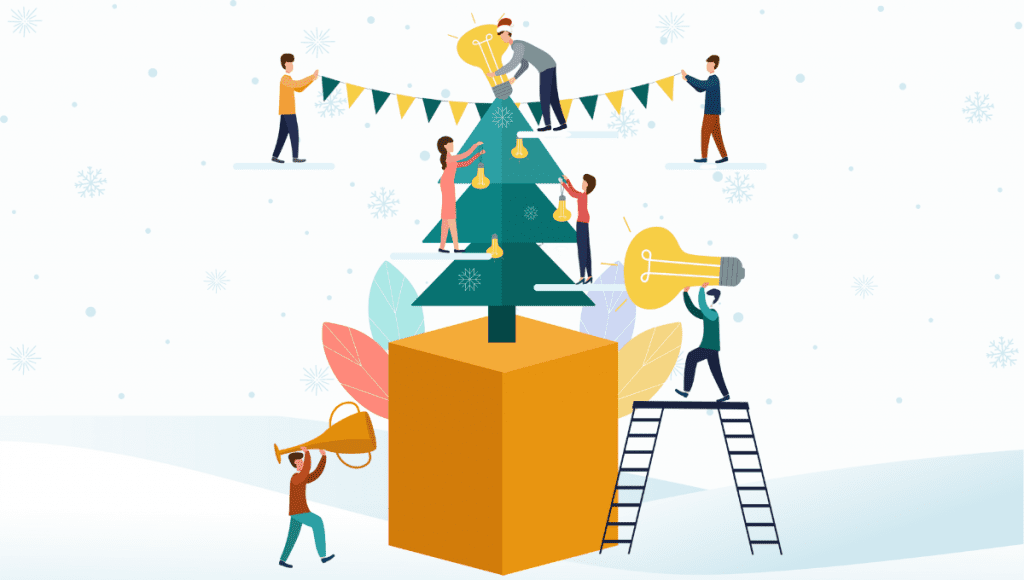With the holidays just around the corner, chances are you’re overwhelmed with all the necessary preparations, along with a hefty list of work deadlines. Whether you’re hosting a party, mentally preparing for awkward conversations during dessert, or feeling nervous about your first in-person holiday work gathering in several years, we’ve pulled together a few neuroscience-backed tips to help you survive some of these common holiday scenarios:
Don’t stop believing?
You’re at the yearly family holiday dinner. You’ve almost made it through dessert, amazed that the conversation hasn’t yet fallen into the political rabbit hole. Just when you think you’re safe, a cousin brings up the validity of the latest election results. He ends with an accusation of how the candidate you voted for cheated to win. You think to yourself, “Can I trust this information, or is it just bullshit?”
Before responding, you may want to consider a recent study that tested people’s susceptibility to believing bullshit statements, and their confidence in their abilities to distinguish them.
Drumroll for the results: People who are the worst at detecting bullshit statements are actually the ones who think they’re the best at it. Researchers coined this finding the “Bullshit Blindspot,” a type of cognitive bias or mental shortcut that our brains use to be more efficient when making quick decisions. This is an example of an expedience bias, in which we choose to believe the first or most readily available information. For a cherry on top (of the pecan pie you’re devouring), the people with the worst BS detectors are also the ones who bullshit the most frequently.
What does this mean for your table conversation? Before responding, pause to consider all information in a humble way but with a large grain of salt — there’s a good chance that if someone is trying to BS you, they’re also the easiest to be persuaded into believing it in the first place.
A merry moral compass
You volunteered to host a New Year’s Eve party. The last time this group got together, everyone left in a huff after a competitive board game tournament, so you’re scrambling to think of how to handle it differently this time around. Luckily for you, neuroscience has gifted us with two simple fixes to improve your guests’ behavior.
Plenty of research has shown that odor is one of the easiest ways to trigger memories, both good and bad. But smell can also help us behave in ways that are a bit more morally sound. Here we’re considering two types of human behavior: prosocial behavior (or generosity) and fairness.
In a study poignantly titled “The Smell of Virtue,” researchers placed participants into either an unscented room or one with a few spritzes of a citrus odor. In one task, participants’ likelihood of being generous was tested by asking whether they would donate a sum of money to a charity. In another, to test a person’s likelihood of being fair, each participant was given $12 from an unknown person not in the room and asked to decide how much to keep and how much to give back. Being in a scented room increased both the likelihood of participating in a charitable cause and the amount of money given back to a stranger (almost half).The results show that when environments smell clean, people are more generous and fair. So perhaps focus less on choosing the perfect tablecloth and more on picking the right candles and air fresheners for your party.
Once you’ve got your sense of scents, it’s time to turn to the tidiness factor. Recent work has shown neatness and order in a room can prevent immoral behavior, such as cheating at Pictionary. This is likely based on our brain’s response to environmental certainty, where a lack of it can engage the brain’s threat circuitry. This leads to feelings of distress and a lack of self-control, or in this case, a cheating incident that could end the party early.
A big takeaway for the party: Organize your space and plug in a Febreze before guests arrive.
Eye of the beholder
With the dreaded holiday gift list in hand, you enter the madness of the mall. “Is that toy really something my daughter needs, or do I want it because I saw someone else looking at it?”
A recent study from the Journal of Neuroscience suggests that we might be more socially gullible than we think. Here, researchers tested a phenomenon called “joint attention,” or following the gaze of someone else. When we see someone else looking at an object, our attention shifts in a direction to mirror theirs. This shift causes us to value the object more than if someone else wasn’t looking at it. In fact, our willingness to pay for items increases when we observe others gazing at them, and it’s associated with higher activity in brain regions that encode goals or in this case, the value of items in our environment.
So, yes, our opinions really can be that fickle. When it comes to holiday shopping, think about yourself fighting for that toy in the mall. Do you really need it, or did the value change when you saw others eyeing it? This time around, maybe stick to online ordering (keeping in mind the “47 other people are viewing this item” might be a vendor’s way to trigger a similar response).
Happy holidays!






